
An Introduction to Shuwayya ‘An Nafsi
Is Shuwayya ‘An Nafsi for you?
| Format | PDF eBook |
|---|---|
| Level | A1, A2 |
| Length | 224 pages |
| Audio? | Yes |
10 Egyptians x 30 questions = 300 responses. Read, listen, expand your vocabulary, and learn to express yourself better in Egyptian Arabic.
Click the icon or scroll down to the Audio section to download or stream the accompanying audio for free.
Shuwayya ‘An Nafsi (“A Little About Myself”) will be of tremendous help to independent language learners who want to develop their conversational skills and increase their Arabic vocabulary.
Shuwayya ‘An Nafsi presents the results of a survey given to 10 Egyptians. Each of the 30 sections in the book begins with a question from the survey followed by the 10 responses and a breakdown of the vocabulary. Each section concludes with a page where you are encouraged to give your own answer to the question using newly learned words and phrases.
The book has been designed in such a way that it can be an effective learning tool for learners at all levels, with glossaries of even the most basic words for beginners, and unvoweled texts and Modern Standard Arabic translations for more advanced learners.
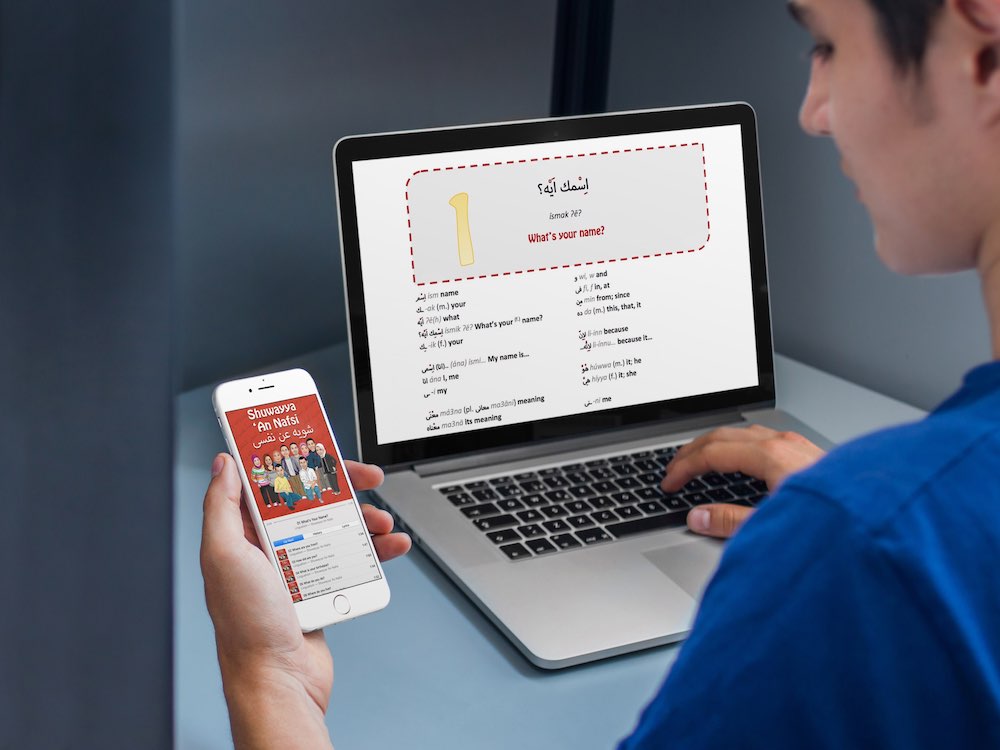
Not sure if this book is right for you? Download a free sample for an extended preview and try out the materials before you decide to buy. See how the PDF eBook looks on your screen and how it prints out.
After signing up, you will receive a confirmation email with an activation link. Once you have activated your account, navigate back to this same place (or refresh the page), where you will find the accompanying audio.

Is Shuwayya ‘An Nafsi for you?
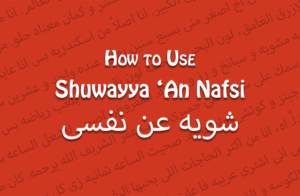
Learn how to use the materials in the books effectively.
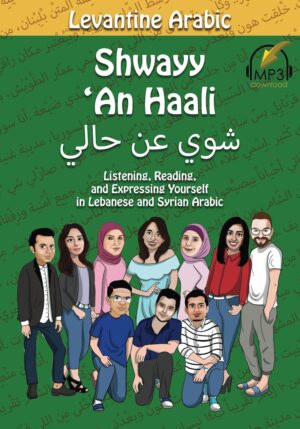
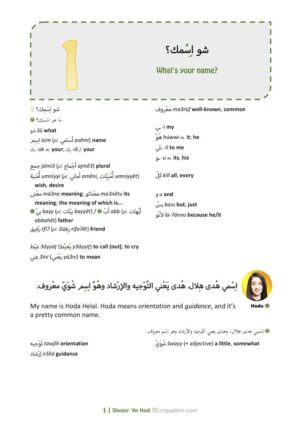
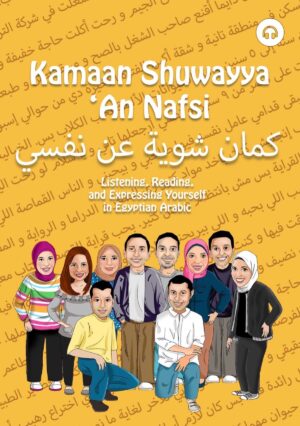
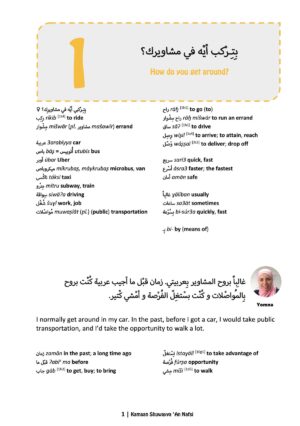
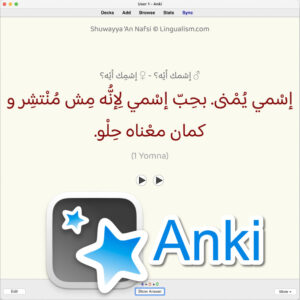
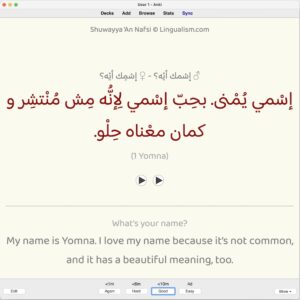
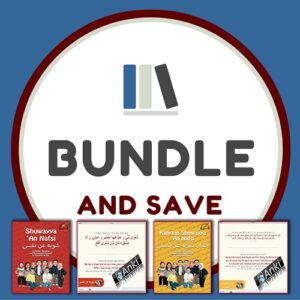
You must be logged in to post a review.
© 2024 Lingualism LLC
Already registered? Log in here.
Patrick Baggett (verified owner) –
A very unique idea and an excellent resource. The speakers speak at native speeds and answer a number of questions. Because each question receives ten responses, you really get to hear a lot of different ways to phrase things, but also commonalities between the answers.
The glossary for each speaker and for each response is impeccably well-done and teaches not only individual words, but useful expressions. One can also intuit various grammar functions by seeing the same patterns over and over.
Here is what I’ve found helps me to get the most out of the book:
1) Read the title of the section (“Ismak eh?” -> “What’s your name”) to understand what is happening.
2) Close the book, listen to all of the responses, listening for common words. It doesn’t matter if you understand yet, but listen for repetitive phrases. These are key phrases/words.
3) Listen again! 🙂
3a) [Optional, Advanced] If you want to test listening comprehension, transcribe the conversation. This may require lots of repetition.
4) Start at the beginning, and read Arabic the first person’s response with the audio playing. Pause when the answer is over.
5) Study the vocabulary below, and the English translation.
6) Rewind, listen to the response again, but this time, read the English with it too.
7) Try reading it aloud.
8)Listen to it again, comparing your pronunciation to the speakers.
9) Repeat as necessary until you feel like you’ve got it. [record self for comparison if desired]
10) Great! Finished one speaker’s response. Move on to the next one!
Of course, this is just what I do. Depending on time, you may just want to read along and later spend more time with each question individually.
Mark (verified owner) –
Great book!
Stefano (verified owner) –
Really enjoyed the contextual organization of the book. And the way grammatical points are aded slowly. Helps with assimilation.
On the down side I wish each conversation was a separate recording.
Spoken speed is very native and hard to understand. Would like to set one dialog on repeat so I can get used to the speed.
Lingualism (verified owner) –
I recommend using the Anki flashcards for Shuwayya ‘An Nafsi for isolating individual responses. You can repeat the audio for a single response as many times as you need by pressing “r” on an Anki flashcard.
Hazel (verified owner) –
I’m about half way through this book and I think it’s great, even when I don’t have too much time to sit down and study. It’s good for picking up vocab and phrases (and brilliant that everything is written out in both English-style spelling and Arabic script) and practicing listening/reading too – I’ve been listening to the audio files when I’m out and about to try and help myself remember everything. Lots of different topics are included and it’s just great to hear the same thing said in different ways as is usual in a real-life spoken language. I’d definitely recommend this book! The way I usually study it is 1. Listen without looking to see what I understand. 2. Practice reading the Arabic script, then check my reading with the English-style spelling, and finally read the translations underneath (and then listen again while reading). 3. Add any new vocab/phrases into my ANKI flashcard deck. 4. Listen again one more time without looking. 5. Continue practicing with the flashcards/listening to the audio later on… (I also sometimes write/say my own response to the question).
Loick –
The book shows up with several main qualities. Among them, the shortness of the contents answers perfectly to some difficulties that come along to beginners when they face too long resources and can’t follow exactly what it is said. Here in this book, the notes that go along the answers of the characters help you to understand and eventually use the words and expressions again, as if you were egyptian. Moreover, the records of the questions and the answers warrants for the right pronunciation. A must read !
Eñaut (verified owner) –
An excellent book based on an excellent idea: answering, in different ways and with different levels of difficulty, very basic questions about yourself. That’s extremely useful because, until you reach an upper-intermediate level, that’s basically what you do all the time: speak about yourself and repeat your life story over and over. And that’s where this book becomes very handy, to learn new and enriched ways of expressing the same facts.
Fatuna –
this book is one of my favorite i ordered Paper Book from Amazon ,it is so easy to understand and ready sentences with translation ,lots of expression,and most common questions that have answers and gives you lots of idea